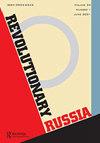Kerensky as ‘Traitor’: Symbolic Politics, Rumour and the Political Deployment of Rumours in the Revolutionary Period
IF 0.2
2区 历史学
Q2 HISTORY
引用次数: 0
Abstract
This article is concerned with the de-legitimating tactics used against Aleksandr Fedorovich Kerensky. It draws on both expert political assessments and a considerable quantity of rumours. Journalism, political resolutions, and letters and diaries written by people of different views are examined for negative representations of Kerensky that are associated with allegations of ‘betrayal’, ‘treachery’ or ‘moral degeneracy’ during his time in the Winter Palace. Such negative representations were informed by both the European republican tradition and the patriotic mobilization, which portrayed the residences of enemy heads of state during the First World War as hotbeds of corruption, treason and depravity. For example, in 1917 rumours about Nicholas II, the empress Aleksandra Fedorovna and Rasputin became a conspicuous element of mass culture. In Kerensky’s case, negative representations had begun to spread in connection with the preparations for the June Offensive, but they proliferated in July when he became head of the Provisional Government and especially when the seat of the government was moved to the Winter Palace. Kerensky was compared to the former emperor and rumoured to be enjoying the trappings of imperial power, engaging in amoral behaviour and using narcotic substances. There were also implausible rumours that the head of the government was a traitor. Such rumours were spread publicly by Kerensky’s opponents on right and left alike in a sign of the Provisional Government’s growing political isolation. This period (Kerenshchina) repelled parties that both were opposed to one another and favoured resolving the crisis by violent means, social compromise became harder to achieve and the slide to civil war gained momentum.克伦斯基作为“叛徒”:革命时期的象征政治、谣言及其政治部署
本文关注的是针对亚历山大·费多罗维奇·克伦斯基的去合法化策略。它利用了专家的政治评估和大量的谣言。新闻报道、政治决议、不同观点的人写的信件和日记都会被检查,以寻找与克伦斯基在冬宫期间的“背叛”、“背信弃义”或“道德败坏”指控有关的对克伦斯基的负面描述。欧洲共和传统和爱国主义动员都为这种负面表述提供了依据,他们将第一次世界大战期间敌方国家元首的住所描绘成腐败、叛国和堕落的温床。例如,1917年,关于尼古拉二世、皇后亚历山大·费多罗夫娜和拉斯普京的谣言成为大众文化的一个引人注目的元素。在克伦斯基的案件中,与6月攻势的准备工作有关的负面言论已经开始蔓延,但在7月他成为临时政府首脑时,尤其是当政府所在地迁至冬宫时,负面言论激增。克伦斯基被比作前皇帝,据传他享受着帝国权力的外衣,从事不道德的行为并使用麻醉药物。还有令人难以置信的谣言说政府首脑是叛徒。克伦斯基的左右反对者都公开散布了这样的谣言,这表明临时政府在政治上越来越孤立。这一时期(克伦希纳)击退了双方都反对并支持通过暴力手段解决危机的政党,社会妥协变得更难实现,滑向内战的势头越来越大。
本文章由计算机程序翻译,如有差异,请以英文原文为准。
求助全文
约1分钟内获得全文
求助全文

 求助内容:
求助内容: 应助结果提醒方式:
应助结果提醒方式:


